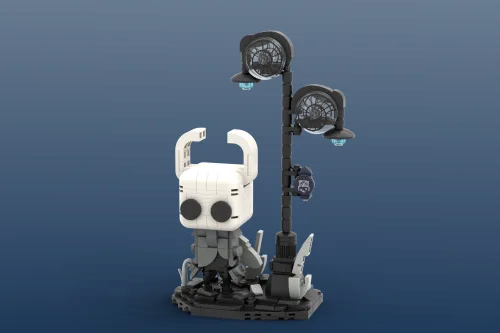
**Assessing the Nine Sols Exchange: A Comprehensive Analysis**
Browse through the eShop any week, and beneath the latest releases section, it’s likely you’ll be inclined to find a Metroidvania, if not a plethora of them. The genre is saturated with so many titles that few manage to stand out. However, Crimson Candle Games’ Nine Sols has made a name for itself earlier this year on PC, and now that it has arrived on Switch, it’s clear to see why.
It combines the intense, precise parrying mechanics found in Sekiro: Shadows Die Twice with enjoyable abilities, skills, and upgrades that are highlighted by excellent sound design and visuals. While the worldbuilding and style didn’t particularly resonate with us, its combat is sufficient to help it stand out amidst its 2024 Metroidvania rivals.
As Yi, it’s possible to feel betrayed by your allies, left alone. Many years later, you’re awakened by a boy, Shuanshuan, and hailed as a long-forgotten hero. After regaining your strength, you interrupt a sacrificial ceremony in order to discover more about Shuanshuan and seek revenge on those who abandoned you, compelling you (as the player) to uncover the truth about the land.
Referred to as ‘Taopunk’, Crimson Candle Games describes the game’s aesthetic as a fusion of cyberpunk and Taoism, a philosophy and spiritual belief with roots in China, where humans and animals coexist harmoniously with the cosmos. This gives the narrative and artwork a delicate, intricate aspect that didn’t quite work for us as much as we had hoped.
The two elements often clash rather than blend seamlessly. For example, the futuristic settings, robotic foes, and cybernetic insects exist alongside landscapes and backdrops that appear contradictory to these technological adversaries. Furthermore, an earthy, ethereal soundtrack that incorporates subtle Chinese instruments doesn’t always complement the theme, despite its relatively unobtrusive nature. Overall, the merging of cyberpunk and Taoism styles feels disjointed, and a more unified design would have been more memorable and engaging.
Despite this, the artistry and animation here are exceptional, featuring fluid movement, well-communicated attacks, and striking visuals, whether it’s the gleam of a spear ready to strike or the way Yi’s cloak flows after a grapple. The overarching revenge narrative and Yi’s character development are among the game’s strongest aspects, guiding us through those moments when the visual style fell short.
Combat was also a major aspect that captivated us. Compared to some Metroidvanias, Nine Sols strikes a pleasant balance. It’s not as finicky and precise as something like Hollow Knight, but it’s not entirely simplistic either. Instead, the closest comparison is indeed Sekiro, as mentioned. Nine Sols emphasizes a defensive style of play, focusing on blocking and parrying attacks, only to unleash powerful combinations or special skills to eliminate foes in a single strike.
While you can achieve this through your primary attack, you also have access to various Talisman abilities via skill trees. These enhance your options as you progress. The first one you acquire, Qi Blast, allows you to hold down the ‘R’ button to dash through an enemy, apply a Talisman to them, and create a massive explosion as they recover from their attack.
It’s all very stylish and highly satisfying, thanks to impressive sound effects, like the clash from a parry. The combat is also intriguing, especially as you advance, demanding better parrying skills and timing from you organically. Nine Sols’ combat never feels unjust, but it can be somewhat merciless if you’re new to challenging Souls-like mechanics. The ‘Jades’ enhancements available as you explore can help a bit, providing passive buffs that increase your attack potency. These may include making you immune to interruptions during certain movements, increasing damage dealt, or minor stat enhancements. Even with these upgrades, there remains a notably high skill threshold.
These abilities expand as you progress and discover new areas (like being able to leap on enemies that execute unblockable attacks to counter them). You can modify these attacks by acquiring new skills, such as extending the charge time for an explosion to deal extra damage. The skill tree is extensive, with choices that genuinely matter. It’s not too overwhelming, and the decisions you make do not feel like mere incremental stat boosts.
